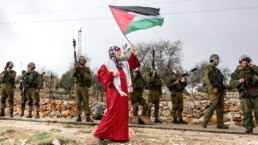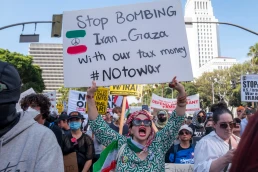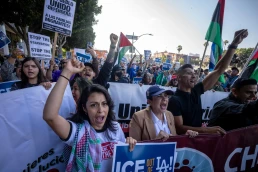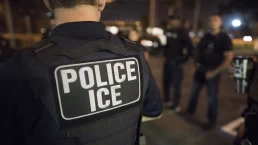The sexual degradation of Palestinian women is just one addition to the protracted and ongoing politics of humiliation in Occupied Palestine.
By Natalia Marques, Peoples Dispatch
Israeli soldiers’ humiliation of Palestinian women in the occupied city of Al-Khalil (Hebron) on July 10 was not the first such episode. Sadly, it will not be the last.

“We need to remind people that they work for the employer, not the other way around,” Gurner said.
“People decided they didn’t really want to work so much anymore through COVID, and that has had a massive issue on productivity,” he claimed. In reality, productivity growth has vastly outpaced wage growth since the early 1970s.
Although the mask-off nature of Gurner’s comments may be shocking, they are not too different from the misleading idea of a “labor shortage” that has been circulating the mass media since the pandemic—arguing that pandemic benefits have created a category of workers too proud to work for a living. As leftist media critic Adam Johnson writes, the “labor shortage” trope employs the notion of worker “laziness” to “normalize and make bipartisan the primary argument for throwing millions off one of the most effective forms of social welfare we’ve seen in decades”—pandemic-era aid.
“A much more elegant way of attracting workers is to simply increase wages by a meaningful amount,” Johnson writes.
Gurner makes it clear that CEOs don’t want an end to a supposed “shortage” so much as to put all control back in the hands of capital, especially during a resurgence in the labor movement. With UPS Teamsters winning record raises and UAW workers demanding wage increases tied to inflation, workers are demanding a more equal share of the wealth that they create.
As pandemic benefits end, despair increases
But to the US working class, the economic “pain” that Gurner describes is already here.
Recently released US Census data shows that in 2022, the child poverty rate more than doubled—from 5.2% (a record low which was a result of pandemic aid) to 12.4%. This enormous increase coincided with the ending of the child tax credit, a federal tax benefit, expanded in 2021, that provided up to USD 2,000 per year for those with children. When this expanded tax credit expired in December of 2021, 60% of parents who received the monthly tax credit reported increased difficulties in paying expenses, financial stress, and affording basic goods.
On Tuesday, the Census reported that between 2021 and 2022 the people of the US experienced the highest one-year increase in poverty on record. This increase comes after two years of large declines in poverty due to pandemic-era aid programs, which largely expired beginning in 2022.
Nearly four million people lost access to healthcare following the expiration of the pandemic-era Medicaid expansion (Medicaid is government subsidized healthcare). Right now, the tens of millions of children and adults that receive Medicaid or Children’s Health Insurance Program (CHIP) coverage are having their eligibility reviewed and face possible termination of benefits. Sources estimate that by the end of the eligibility review period, between eight to 24 million people will lose Medicaid coverage, two to seven million being children.
According to a report by Moody’s Analytics, the average person in the US is rent burdened, meaning that 30% of the median income is required to pay the average rent. In New York City, one of the most expensive cities to live in but also one of the most populous, the percentage of median income required to pay the rent was 67.8% in 2022. For decades, in fact, median income increases have been unable to keep up with skyrocketing rent increases, with a report by Real Estate Witch (using Housing and Urban Development and Census Bureau data) claiming that rent increases have exceeded income increases by 325% since 1985.
How can US workers fight the trend towards impoverishment? Unionized labor is waging bold contract campaigns to reverse decades of wage stagnation, while organizations like the Debt Collective are organizing working people who owe debts for things that should be free, such as medical care and higher education. Newer labor organizations are building a movement among the lowest paid workers, such as service industry workers. As workers fight back, the rich and powerful couldn’t make it more clear: it’s us against them.
Indeed, the stripping of five women in front of their children, parading them naked around their family home and then stealing their jewelry by an Israeli military unit was not a random act. It deserves deep reflection.
Palestinians rightly understood the event – investigated at length by the Israeli rights group B’Tselem in a report published on September 5 – as an intentional Israeli policy.
Several attacks by Palestinians in Jericho and Jerusalem have already been linked to the call for revenge made by Palestinian groups, including women collectives.
We are expecting the Resistance “not to stand idly by in the face of this heinous (crime),” a spokesperson for a women’s group in Gaza said on September 5.
The B’Tselem investigation was damning. “Dozens of masked soldiers, with dogs” raided the ‘Ajlouni family in southern Hebron, B’Tselem said. They “handcuffed three family members,” including a minor, “separated men from women and children, and began an extensive search of them and their home.”
The humiliating episode was yet to follow, as “masked female soldiers” threatened a mother with a dog and forced her to strip completely naked in front of her children.
The degrading treatment was repeated against four other women, as they were forced to move, naked, from room to room. Other soldiers, meanwhile, were busy stealing the family’s jewelry, according to the report.
Corporate Western media ignored the investigation, although it enthusiastically reported on the retaliatory attacks on Israeli occupation soldiers by Palestinian youth in Jericho and Jerusalem, providing little or no context to what they perceived as ‘Palestinian terrorism.’
But the Hebron women and the ‘Ajlouni family are the actual victims of terrorism – Israeli terrorism.
Though the Hebron incident is a repeat of numerous violations of Palestinian rights and dignity spanning many years, there is still much we can learn from it.
Humiliating Palestinians is an actual Israeli policy and cannot be attributed to a few bad apples in the so-called “most moral army in the world.”
This assertion can easily be demonstrated by a quick comparison of the behavior of Zionist militias during the Nakba (1947-48) to later episodes and, eventually, to the recent events in Hebron.
Israeli historian Ilan Pappe’s ‘Ethnic Cleansing of Palestine’ provides illuminating, although difficult to read, passages on the rape of Palestinian women during those horrific years.
Last year, the Israeli newspaper Haaretz reported that sensitive references were purposely removed from unclassified Israeli military documents concerning the events that led to the Nakba.
It quoted Aharon Zizling – the country’s first minister of agriculture – as saying that although he “can forgive instances of rape (in the Palestinian city of Ramleh) … I will not forgive other acts.”
Such callousness was entirely consistent with the violent behavior and attitude exhibited by the militias – later to form the Israeli army – and their leaders, including David Ben Gurion, who later became Israel’s first prime minister. In the document, Israel’s founding father called for the “wiping out” of Palestinian villages. This, too, was removed from the documents.
Most Israelis are unaware of this sordid past simply because the subject is banned in school. The so-called ‘Independence Day Law’ – also known as the Nakba Law of 2009 – “outlaws any mention of the Nakba or reference to the establishment of the State of Israel as a day of mourning,” according to the legal group, Adalah.
Though Israel has succeeded in deceiving its people regarding their collective past, the historical processes that produced such violence remain in place. This means that Israel continues to reproduce that same violence in different forms, even though every generation is largely unaware of how their behavior continues the legacy of previous generations.
It also means that soldiers who humiliated the Palestinian women in Hebron are likely unaware of the mass violence that accompanied the Nakba; they might not even be aware of the term ‘Nakba’ itself.
Their behavior, however, is indicative of the culture of violence in Israel, the rooted racism and this persistent desire to humiliate Palestinians.
This was equally true during the First Intifada, the uprising in 1987-93. Back then, sexual violence went hand in hand with Israeli violence against the Palestinian population.
The sexual abuse of Palestinian women during the Intifada, especially in Israeli prisons, was commonplace. The Israeli military used this tactic to exact confessions or to discourage female activists and their families from pursuing the path of resistance.
All of this falls into the realm of the ‘politics of humiliation,’ a centralized political strategy used to establish control and dominance over occupied nations.
The Israelis have excelled in this field. We know this because of the numerous reports by Palestinians and the testimonies of Israelis. This was amply demonstrated in the reports provided by the Breaking the Silence group – Israeli soldiers who either left or refused to join the Israeli military.
Many of these ‘refuseniks’ who spoke out publicly have cited the dehumanization and degradation of Palestinians at the hands of Israeli soldiers as one of the reasons why they walked out.
This illustrates that such events are neither marginal nor isolated, supposedly carried out by mentally fatigued soldiers who violated army roles. The exact opposite is true.
The sexual degradation of Palestinian women is just one addition to the protracted and ongoing politics of humiliation in Occupied Palestine.
When Palestinians resist, they do so to reclaim their land, their fundamental freedom and human rights, and redeem their collective honor, trampled daily by the Israeli army.
Indeed, resistance in Palestine is not a mere ‘strategy’ to recover a stolen homeland. It is, in the words of Frantz Fanon, “a sense of freedom” from “despair and inaction” and a collective act of restoration of “self-respect.”
This explains why Palestinians continue to resist, even if their resistance is often derided as ineffectual and futile and why they will continue to resist for many years.
Dr. Ramzy Baroud is a journalist, author and the Editor of The Palestine Chronicle. He is the author of six books. His latest book, co-edited with Ilan Pappé, is ‘Our Vision for Liberation: Engaged Palestinian Leaders and Intellectuals Speak Out.’ His other books include ‘My Father was a Freedom Fighter’ and ‘The Last Earth.’ Baroud is a Non-resident Senior Research Fellow at the Center for Islam and Global Affairs (CIGA). His website is www.ramzybaroud.net
Recent Posts
Is A Citizens United 2.0 Right Around The Corner?
July 15, 2025
Take Action Now Is it possible for American democracy to be further degraded by the influence of billionaires? Thanks to champion of the working…
U.S. Leaders Gave Up On Diplomacy With Iran. We Must Make Them Return To It.
July 15, 2025
Take Action Now Building an antiwar movement means preventing the systemic U.S. aggression that creates the conditions for war.By Hanieh Jodat,…
What To Do When You See ICE In Your Neighborhood
July 14, 2025
Take Action Now How can you deter the Trump administration’s immigrant deportation machine when it pops up in your community? Follow these…
ICE Campaign Of Violence Will Lead To More Deaths
July 14, 2025
Take Action Now Jaime Alanis’s death shows the horrific consequences of a secret police force behaving with utter impunity.By Natasha Lennard, The…




